5 Easy French Language Games
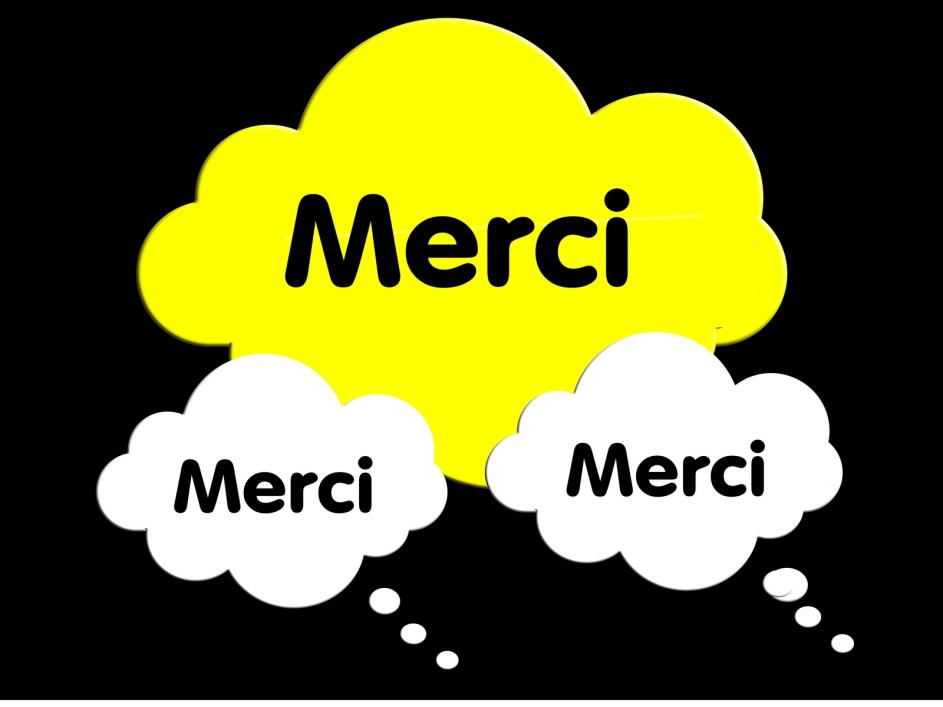 Are you just beginning to learn French?
Are you just beginning to learn French?
Here are 5 Easy French Language Games that make practicing some essential French words fun.
The games also help you build some basic vocabulary and sharpen your pronunciation.
And if you learn to pronounce "Merci" correctly (hint: not like mercy!), you might even get a smile from the French person who is helping or serving you!
French is an official language in 5 European countries: France, Belgium, Switzerland, Monaco, and Luxembourg. It is also spoken as an official language in 24 other countries worldwide.
For English learners, French pronunciation can be a little hard.
That's especially true for French nasal sounds and certain other sound combinations that don't exist in English. But practice will help.
French is a beautiful, melodious language and worth every effort.
Even just some basic French will make you feel more confident when traveling and engaging with French speakers.
To get you in the French language mood, you can start below with a game that reviews common greetings and polite expressions.
When you play, you need to say the French out loud. Just remembering the words silently won't do the job.
Focus on the sound of a word and let it soak in, then see if your own pronunciation gets close.
You can play these games as often as you like.
They are free – as are all our games and courses – and you'll not be bothered by Google ads either.
Just play, have fun and learn!
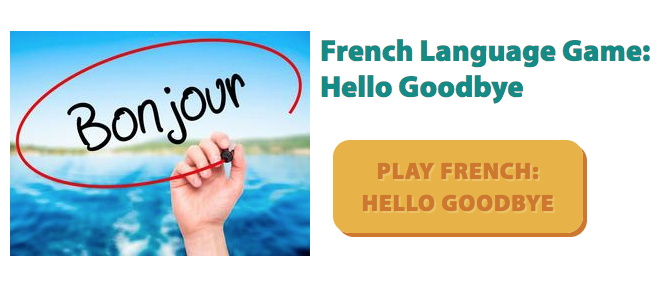 1. Hello Goodbye
1. Hello Goodbye
When in a French-speaking environment, using greetings and polite phrases is a friendly and respectful way to interact with others.
Throwing out "hi" or "hello" to a waiter who comes to your table, or when buying in a shop, getting tickets, etc, is really not the way to go.
Say "bonjour" in your best French. If you then have to switch to English, it's okay.
Click on the French Language Game: Hello Goodbye.
Play the game a couple of times, and then play it again a few days later to review what you've learned.
The words and phrases are short, but they contain typical French sounds that need practice.
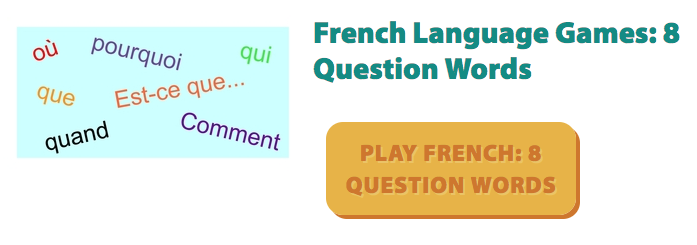 2. French Question Words
2. French Question Words
Question words are an efficient way to get information, ask about cost, set up appointments, ask for directions, etc.
It's empowering to be able to understand and say them. The words are short, but it takes a little practice to make them automatic.
Click on the French Language Game: 8 Question Words.
Below is a list you can check before you start:
• qui ? - who?
• que ? - what?
• quand ? - when?
• où ? - where?
• comment ? - how?
• pourquoi ? - why?
• combien ? - how much?
• est-ce que ? - question phrase [is it that?]
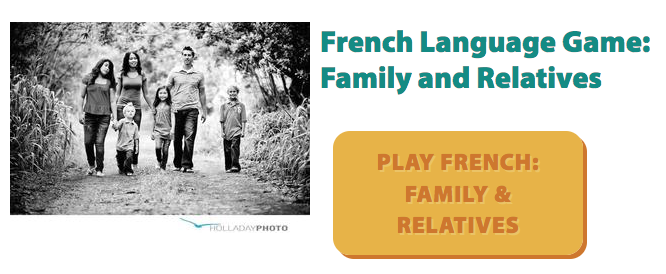 3. Family and Relatives
3. Family and Relatives
The French words for mother, father, brother, sister, aunt, uncle, grandfather, cousin, are nice to know.
They also provide a good opportunity for pronunciation practice.
In the game you'll focus on the vowels "è" (père, mère); "oeu" (soeur); nasal "a + n" (tante, grand) and "o + n" (oncle); as well as be aware of silent "e" (père, mère, frère, tante).
And, with these words you can easily practice French noun gender.
In English, we have one definite article that goes with any noun: "the".
It's the same word for singular and plural nouns: the father, the mother; the fathers, the mothers.
In French, a noun is either masculine "le père" (the father); or feminine "la mère" (the mother).
If a noun starts with a vowel, then the article becomes "l' ": l'oncle.
The French word for "the" with plural nouns, masculine or feminine, is "les".
Click on French Language Game: Family and Relatives
The words for family members are easy to learn.
And with our Shootout game, it's fun to review and practice the French masculine and feminine articles for "the" and for the possessives "my" and "your".
 4. Easy Verbs - Present Tense
4. Easy Verbs - Present Tense
Verbs are important building blocks for making sentences, even short and easy ones.
You need verbs to talk about actions, thoughts, feelings, states of being - yours and those of other people.
With French verbs, a good place to start is with regular "-er" verbs. More than 80% of French verbs belong to this group.
Using personal pronouns (I, you, he, she, etc.) with many English verbs is easy.
In the present tense you just have to remember that the 3rd person sing (he, she, it) takes an -s.
However, French verbs have more complicated conjugation rules.
Even regular -er" verbs have 5 different endings that go with the respective pronouns.
Click on French Language Game: 8 Easy Verbs
With this game you'll learn 8 common French "-er" verbs and their present tense endings.
Once you get the pattern down, you can apply pattern of endings to any regular "-er" verb.
Here's a list of the verbs you'll learn.
• chercher - to look for
• demander - to ask
• donner - to give
• habiter - to live (reside)
• montrer - to show
• parler - to speak
• penser - to think
• regarder - to look at
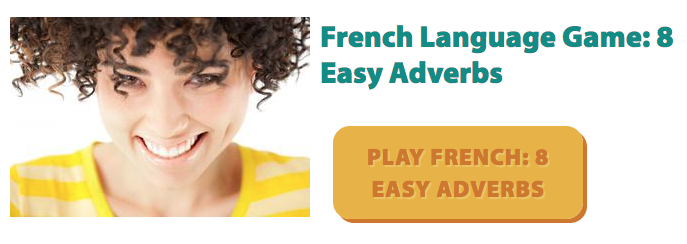 5. Easy Adverbs
5. Easy Adverbs
Finally, with an adverb you can add more information, i.e. where, when, why, how, or how often something happens.
Click on French Language Game: 8 Easy Adverbs.
Here's a list of the adverbs you'll learn and practice.
• enfin - finally
• plus tard - later
• toujours - always
• tout de suite - right away
• très bien - very well
• souvent - often
• un peu - a little
• vraiment – really
Will these games alone make you become fluent in French? Not likely.
But play these and the many other games on our site regularly, especially when other courses become too tedious and boring.
And always say the French out loud.
This way you won't give up learning and practicing.
Remember: learning a new language takes time and persistence.
If you can find ways to make learning and practicing French a daily habit, you'll be on a good path to language fluency.
